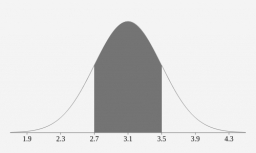Probability 30311
There are 200 components in the production batch, of which 26 have a plus deviation from the nominal value. Calculate the probability that none of the 10 products selected will have a positive variance if we make selections without repetition
Final Answer:

Tips for related online calculators
You need to know the following knowledge to solve this word math problem:
statisticscombinatoricsGrade of the word problem
Related math problems and questions:
- Probability
 In a batch of 500 products, there are 10 rejects. In a statistical inspection, 40 products are checked, which are randomly selected from a batch, and the selection is made without repetition. The batch is considered satisfactory if there is at most one de
In a batch of 500 products, there are 10 rejects. In a statistical inspection, 40 products are checked, which are randomly selected from a batch, and the selection is made without repetition. The batch is considered satisfactory if there is at most one de - Balls
 We have n identical balls (numbered 1-n) selected without replacement. Determine 1) The probability that at least one tensile strength number coincides with the number of balls? 2) Determine the mean and variance of the number of balls, which coincides wi
We have n identical balls (numbered 1-n) selected without replacement. Determine 1) The probability that at least one tensile strength number coincides with the number of balls? 2) Determine the mean and variance of the number of balls, which coincides wi - Ball bearings
 One bearing is selected from the shipment of ball bearings. It is known from previous deliveries that the inner bearing radius can be considered a normal N distribution (µ = 0.400, σ2 = 25.10^−6). Calculate the probability that the selected radius will ex
One bearing is selected from the shipment of ball bearings. It is known from previous deliveries that the inner bearing radius can be considered a normal N distribution (µ = 0.400, σ2 = 25.10^−6). Calculate the probability that the selected radius will ex - Conditional probability
 Suppose a batch contains ten items, of which four are defective. Two items are drawn at random from the batch, one after the other, without replacement. What is the probability that: I) Both are defective? Ii) Is the second item defective?
Suppose a batch contains ten items, of which four are defective. Two items are drawn at random from the batch, one after the other, without replacement. What is the probability that: I) Both are defective? Ii) Is the second item defective? - Lifespan
 The lifetime of a light bulb is a random variable with a normal distribution of x = 300 hours, σ = 35 hours. a) What is the probability that a randomly selected light bulb will have a lifespan of more than 320 hours? b) To what value of L hours can the la
The lifetime of a light bulb is a random variable with a normal distribution of x = 300 hours, σ = 35 hours. a) What is the probability that a randomly selected light bulb will have a lifespan of more than 320 hours? b) To what value of L hours can the la - Probability 81685
 There are 49 products in the box, of which only 6 are good. We will randomly draw 6 products from them. What is the probability that at least four of the products drawn are good?
There are 49 products in the box, of which only 6 are good. We will randomly draw 6 products from them. What is the probability that at least four of the products drawn are good? - The average 7
 The average lifespan for cricket is 90 days, with a standard deviation of 13 days. If we assume that the lifespan of cricket is normally distributed, a. What is the probability a randomly selected cricket has a lifespan of fewer than 75 days? b. What is t
The average lifespan for cricket is 90 days, with a standard deviation of 13 days. If we assume that the lifespan of cricket is normally distributed, a. What is the probability a randomly selected cricket has a lifespan of fewer than 75 days? b. What is t
